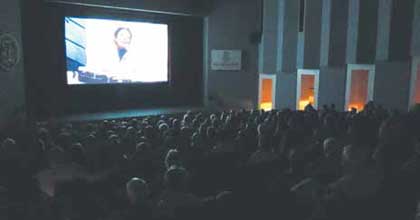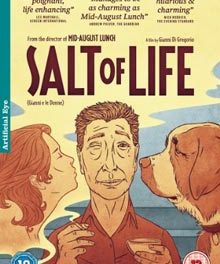Countdown to the 2014 Beaufort International Film Festival
 Each July Ron and Rebecca Tucker get the jitters. Six months after the curtain drops on the 2013 Beaufort International Film Festival, the two principal organizers are invariably afflicted with a case of the “What Ifs?” Even though the festival continues to grow in both size and quality, each year the same nagging doubts come scratching at the door: What if we don’t get enough submissions? What if no one comes? What if ticket sales are off? What if, what if, what if?
Each July Ron and Rebecca Tucker get the jitters. Six months after the curtain drops on the 2013 Beaufort International Film Festival, the two principal organizers are invariably afflicted with a case of the “What Ifs?” Even though the festival continues to grow in both size and quality, each year the same nagging doubts come scratching at the door: What if we don’t get enough submissions? What if no one comes? What if ticket sales are off? What if, what if, what if?
“We do get a little nervous this time of year,” says Ron. “But we survive it.”
To paraphrase “Shakespeare In Love,” somehow it all works out in the end. No one knows quite how. It’s a mystery.
With half a year to go before the next festival big things are happening, including a possible return of feature film production to the area. The state’s new and competitive film incentives package along with some strong persuasion by Mr. Tucker appear to have Beaufort poised to host not one but two films (see the “Route 65” sidebar). If all goes according to plan, these productions will look to hire local crew and talent. We’ll keep you posted. In the meantime, we sat down with Ron to get an idea of what’s in store for BIFF 2014:
Mark Shaffer: What was the takeaway from the last festival?
Ron Tucker: I think the biggest thing was that the [USCB Center for the Arts] was the perfect venue for the people who want to come to the film festival. Through the survey that USCB did and the study we did ourselves, we found out that the film festival itself was marked on calendars. It was a destination event. It was all about people coming to Beaufort specifically to attend the film festival. It wasn’t that they just happened to be in the area, they came for BIFF.
As far as the movies were concerned, most comments were along the lines of “you guys just keep moving it up a notch. The movies keep getting better and better. Whatever selection process you have is working. Keep it up.” The fact that we did not have a feature film this year wasn’t missed. Unless we mentioned it, no one brought it up.
MS: And that was a quality issue as far as you and the screeners were concerned.
RT: It was. We had twenty-odd submissions for the Feature Film category, but none of them measured up to the same level as the films in the other categories. We weren’t going to water down Features just to have a Features category. Hopefully, that won’t be the case next year. We’ve already had a few submissions that look like they could play. One’s actually a Russian film. So, it looks promising at this point.
MS: We’re six months past the 2013 festival, six months away from the 2014 event. Every year we talk about this time and you’re always a little, well, anxious about now.
RT: About this time I start to panic a little bit. It’s human nature to procrastinate a bit, so people tend to wait to the last minute to get their submissions in. Our early bird deadline is July 31st. We’ve learned that every year our big surge is toward the final deadline, then we’ll get a ton. Right now we’ve got about 25 submissions.
MS: It’s also early in the season with a lot of unfinished films out there; a lot of equally panicky filmmakers trying to make submission deadlines.
RT: We’ve got promises from a whole bunch of people. We must really make it fun for the filmmakers to come here, because they go home promising that they’re going to submit their next film to BIFF. We get a lot of repeat customers. There are a lot of past winners working on films right now.
MS: Features aside, it seems that some of the most important, thought-provoking and controversial films from the last few festivals have been documentaries.
RT: By far. I think documentary filmmakers do consider us a great venue for their films. Even the ones who didn’t win have posted on their Facebook and Twitter accounts that if you can get into BIFF, try and attend, because it’s a hard festival to get into. We don’t have that many selections and we’re limited in the time that we have to show the films, so we have to be a little more selective than some festivals.
We had a lot of local submissions last year that might have had a lot of local interest. But they paled in comparison to all the entries with a broader world interest. They were good films for locals and for people who knew that particular filmmaker, but on a grand scale, people from someplace like California aren’t going to identify with it.
MS: The subject matter’s just a little too inside.
 RT: Right. We’ve had local filmmakers – people we know – who don’t understand why they didn’t make it. Friendships aside, it is a level playing field when they submit their film. If you make it, you made it on your own merit. You don’t make it because you know somebody. That makes it fair. I think we get some respect for the level of integrity we’ve established and maintain.
RT: Right. We’ve had local filmmakers – people we know – who don’t understand why they didn’t make it. Friendships aside, it is a level playing field when they submit their film. If you make it, you made it on your own merit. You don’t make it because you know somebody. That makes it fair. I think we get some respect for the level of integrity we’ve established and maintain.
MS: I recall some blowback from a local feature a few years ago that got a lot of hype and lost to a long shot. It’s tricky business.
RT: It just wasn’t up there with the rest of them. All in all, every year there’s been some improvement. A couple of years ago Tom Berenger said, “Not only is it bigger, it’s better. And if it’s bigger it’s got to be better.” We’ve held to that.
MS: The 2014 festival also marks a landmark anniversary for Beaufort.
RT: We’ve tried to stay away from a theme for the festival each year because that theme might not mean anything to filmmakers coming from around the world. It may mean something to Beaufort, though. We’ve had 20 plus major motion pictures filmed in the area. If you picked one to build a theme around every year some of the filmmakers are going to get lost in the shuffle. Last year happened to be the 10th anniversary of “Radio” and it worked. It was a good time to have it and the director agreed to come. And when Coach Jones and the real Radio agreed to come along with the Sports Illustrated writer whose article inspired the movie, it was a no-brainer.
As it turns out 2014 mark’s the 20th anniversary of “Forrest Gump,” one of the biggest motion pictures in history. It just makes sense to kind of build the festival around the anniversary theme of the biggest movie ever made here. We’ve already got an agreement from the film’s editor, Artie Schmidt, who will be coming. And we’re going to try and put together a few others. We’re going to put out the word that we’d like anybody who worked on the film to be a part of the festival in some way. We’re thinking about recruiting some Forrest Gump look-alikes and have them help us with publicity by placing them on a bench somewhere downtown with a box of chocolates the month before the festival.
MS: And folks can look forward to some fun events and fundraisers over these next months leading up to the festival.
RT: Like the scavenger hunt we’re planning for September 14th. Hopefully a lot of this will serve as the first shot across the bow to let people know the film festival is coming.
When we recently picked up our Civitas Award from the Chamber of Commerce, I wasn’t going to pass up the opportunity to promote the festival and mentioned it was the 20th anniversary of “Forrest Gump.” You could see the puzzled looks on the faces: It’s been 20 years since “Forrest Gump?” It’s still constantly on and out there and it doesn’t look dated and I think a lot of people will want to come because it is the film’s 20th anniversary.
MS: The festival continues to grow each year. You’ve brought on some extra staff to help fundraise and promote. And now with the USCB survey you’ve got indisputable proof that the Beaufort International Film Festival is a destination event, an economic contributor during an otherwise dead time of year.
RT: I mentioned this at the Civitas Awards, too. We had a room of about 300 people and I don’t think more than a handful had ever been to the festival. I said, “Come to the festival. See what it’s about. After all, what else do you have to do in February?” Nothing.
I think it’s going to be a great festival. You know, every year at the end of the festival somebody always asks, “Well, now what are you going to do?” And I always tell them I’m not going to worry about that today. I’ll worry about it in July.
GET MORE INFO
BIFF returns to the USCB Center for the Performing Arts in February. Support your local film festival and learn about the benefits of membership in the Beaufort Film Society by calling 843-522-3196, clicking on www.beaufortfilmsociety.org or drop by the office at 708 Carteret St. Beaufort, SC.
Mark Shaffer’s email is backyardtourist@gmail.com






